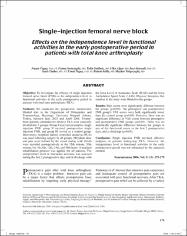Single-injection femoral nerve block - Effects on the independence level in functional activities in the early postoperative period in patients with total knee arthroplasty

Göster/
Tarih
2006Yazar
Tuğay, NazanSarıcaoğlu, Fatma
Satılmış, Tülin
Alpar, Ülkü
Akarcalı, İnci
Citaker, Seyit
Tokgozoglu, Mazhar
Üst veri
Tüm öğe kaydını gösterÖzet
Objective: To investigate the efficacy of single injection femoral nerve block (FNB) on the independence level in functional activities in the early postoperative period in patients with total knee arthroplasty (TKA). Methods: We conducted this prospective, randomized, blinded trial in the Department of Orthopedics and Traumatology, Hacettepe University Hospital Ankara, Turkey, between June 2003 and April 2004. Twenty-three patients scheduled for elective TKA were randomly divided into 3 groups. Group I received preemptive single injection FNB, group II received postoperative single injection FNB, and group III served as a control group. Intravenous morphine patient controlled analgesia (PCA) was used following surgery in all groups. Morphine dose and pain score defined by the visual analog scale (VAS) were recorded postoperatively at the 15th minute, 30th minute, 1st, 4th, 6th, 12th, 24th, and 48th hours. A standard rehabilitation protocol was applied for all patients. The independence level in functional activities was assessed during the first 2 postoperative days and at discharge with the Iowa Level of Assistance Scale (ILAS) and the Iowa Ambulation Speed Scale (IASS). Physical therapists that enrolled in the study were blinded to the groups. Results: Pain scores were significantly different between the groups (p<0.05). The preemptive and postoperative FNB group's VAS scores were both significantly lower than the control group (p<0.05). However, there was no significant difference in VAS scores between preemptive and postoperative FNB groups (p>0.05). There was no statistically significant difference between the groups in any of the functional scores in the first 2 postoperative days, and at discharge (p>0.05). Conclusion: Single injection FNB provided effective analgesia in patients undergoing TKA. However, the independence level in functional activities in the early postoperative period was not influenced by the analgesia method.

















